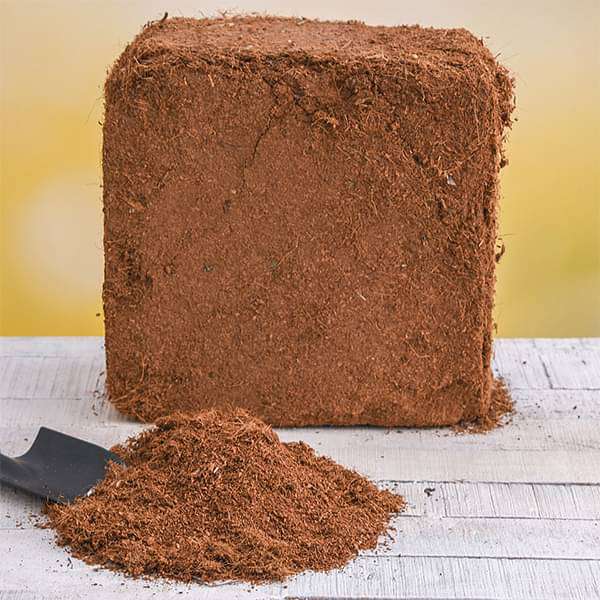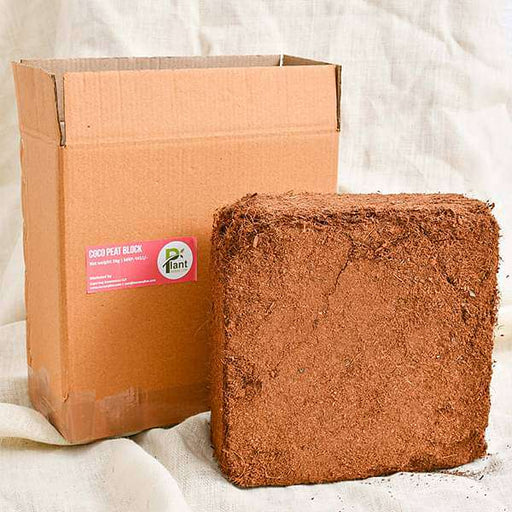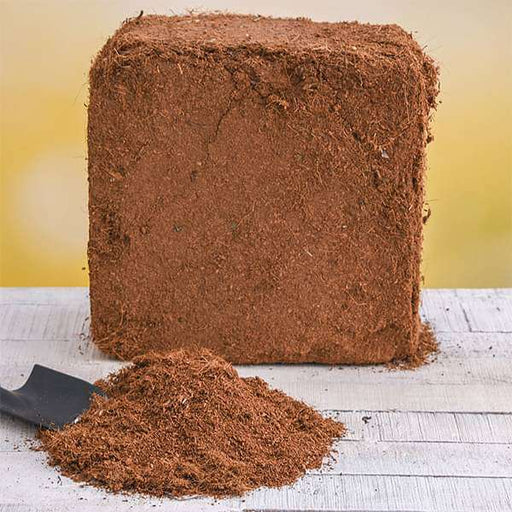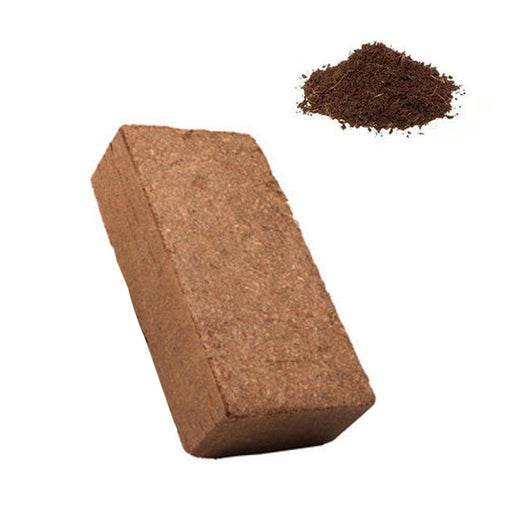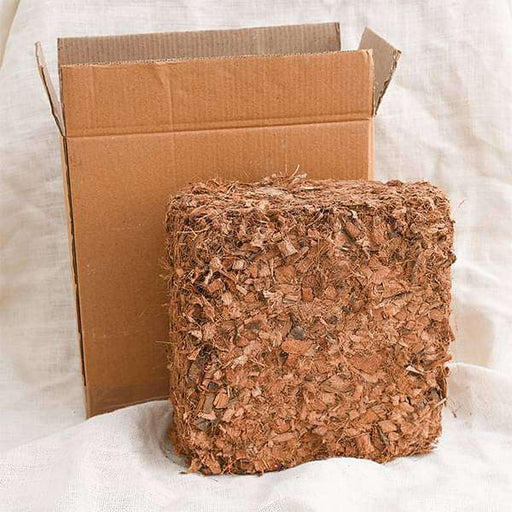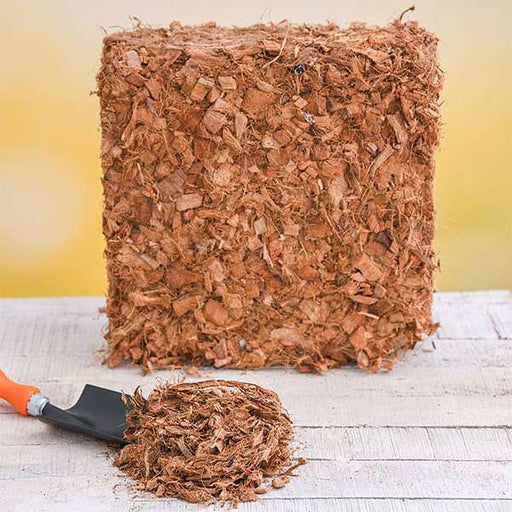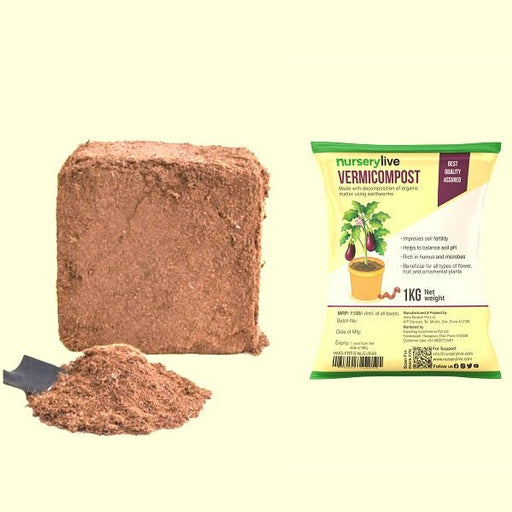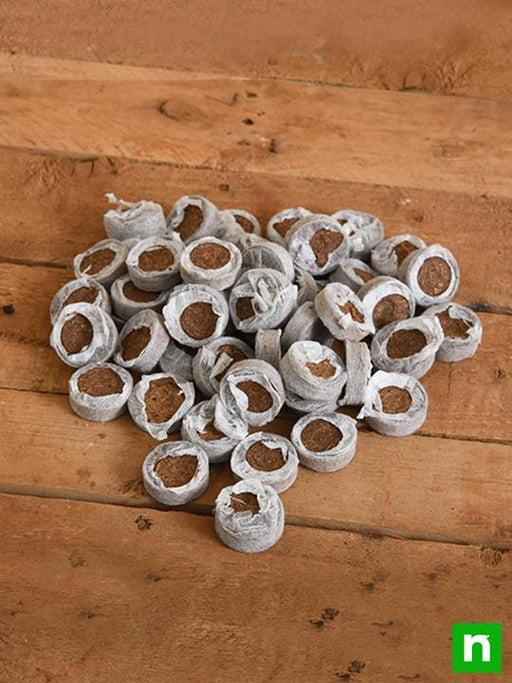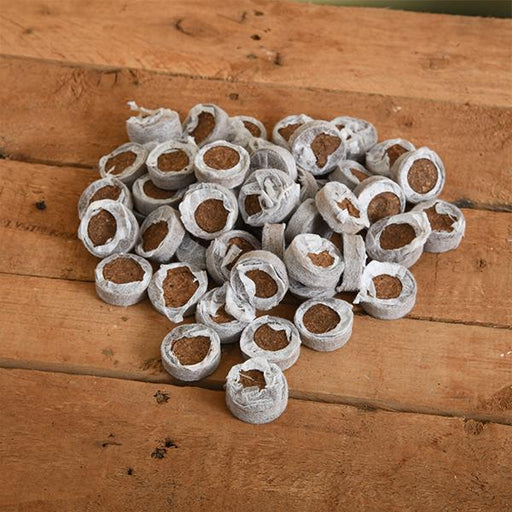Cocopeat
Cocopeat is a multi-purpose cultivating medium that is made from coconut husk. The coconut husk, which is fibrous, is washed before being machine dried, filtered, and made free of dirt and other contaminants like animal and plant residues.
Cocopeat is an excellent alternative to peat-moss or Rock wool. Its air-filled porosity and high capacity to hold water make it an ideal substrate for plant cultivation.
It is completely organic and environmentally friendly and free of soil-borne pathogens and weeds.
Cocopeat block & bricks
It often comes pressed into bricks or blocks, which have to be soaked to break them apart.
The product is also found ground into dust, which is called coir dust, and is used to grow indoor and outdoor exotic plants.
Our product range includes a wide range of cocopeat blocks in 1kg and 5kg.
Cocopeat soil
Coco peat is created by removing the pith from the coconut husk. The soil is antifungal and naturally proven and makes it a great option to begin seeding.
Coco peat gardening soil can also be used to amend the natural gardening soil as a potting mix and for hydroponics production.
Cocopeat vs peat moss
Unlike peat moss, coco peat needs less water to achieve the same level of hydration. In addition, coco peat is not spoiled after use – it’s possible to wash and reuse coco peat once a gardening project has come to an end and the soil is no longer needed.
Compared with peat moss – coco peat fares much better: unlike the destruction of peat bogs which takes centuries to reverse, coconuts are easily replenishable.
Cocopeat for plants
Coco peat soil is made from the pith inside a coconut husk. It is naturally anti-fungal, making it an excellent choice to start seed.
Cocopeat uses in gardening
- By potting mix suppliers
- Greenhouse developers
- Hydroponic Growers
- Nursery & Garden center professionals
- Seedling Nurseries
- Lawn and Golf course constructors
- Horticulture and Floriculture applications
- Home Gardening (indoor and outdoor)
- and for landscaping use
Cocopeat benefits
- Cocopeat is light, easy to handle, and can be reused for up to 4 years.
- It is resistant to bacterial and fungal growth.
- Cocopeat disintegrates slowly.
- It is neutral to slightly acidic. This makes it great to be mixed with alkaline garden soil.
- Cocopeat can store and release nutrients to plants for extended periods of time.
- It has great oxygenation properties which are important for healthy root development.
- It is a perfect soil conditioner, and it can retain moisture up to eight times of its volume.
- It is entirely organic.
- Unlike soil, it does not form any mud.
Trending Collections
Organic Cocopeat
Organic cocopeat is a natural and eco-friendly growing medium made from coconut husks. It's a sustainable alternative to traditional soil, and it's free from harmful chemicals and additives. Organic cocopeat is an excellent choice for gardeners who are looking for a more natural and sustainable way to grow their plants.
Cocopeat Bricks
Cocopeat bricks are compressed blocks of cocopeat that can expand when soaked in water. They are a convenient and space-saving way to store and transport cocopeat. Cocopeat bricks are easy to use and can provide a high-quality growing medium for your plants.
Cocopeat Powder
Cocopeat powder is a fine-grained form of cocopeat that can be easily mixed with water to create a soil-like growing medium. It's an excellent choice for seed starting and indoor gardening. Cocopeat powder can provide excellent drainage and moisture retention, making it a perfect growing medium for many types of plants.
Cocopeat for Hydroponics
Cocopeat is an excellent growing medium for hydroponics. It provides excellent moisture retention, aeration, and drainage, which are essential for hydroponic gardening. Cocopeat is also pH neutral, making it an ideal choice for hydroponic systems.
Coco Coir
Coco coir is a byproduct of cocopeat production. It's a fibrous material that can be used as a growing medium, especially for plants that require high moisture retention. Coco coir is an excellent alternative to traditional soil, and it can provide excellent drainage and aeration for your plants.
Coco Peat for Seedlings
Cocopeat is an excellent choice for seed starting. It provides a sterile and nutrient-rich growing medium for your seedlings, and it can help prevent damping-off disease. Cocopeat is also lightweight and easy to handle, making it an ideal choice for starting your seeds indoors.
Organic Coco Peat for Vegetables
Organic cocopeat is an excellent choice for growing vegetables. It's free from harmful chemicals and additives, making it safe for consumption. Organic cocopeat can provide excellent drainage and moisture retention, which are essential for growing healthy vegetables.
Cocopeat for Container Gardening
Cocopeat is an ideal growing medium for container gardening. It's lightweight, easy to handle, and provides excellent drainage and moisture retention. Cocopeat is also pH neutral, making it an excellent choice for container gardening.
High EC Cocopeat
High EC cocopeat is a type of cocopeat that has a high electrical conductivity. It's an excellent choice for plants that require high levels of nutrients, such as tomatoes and peppers. High EC cocopeat can provide excellent drainage and moisture retention, making it a perfect growing medium for these types of plants.
Washed Cocopeat
Washed cocopeat is cocopeat that has been washed to remove excess salts and other impurities. It's an excellent choice for hydroponics and other types of growing systems that require a clean and sterile growing medium. Washed cocopeat can provide excellent moisture retention and drainage, making it an ideal growing medium for many types of plants.
Coir Fiber
Coir fiber is a fibrous material that is extracted from the outer husks of coconuts. It's a natural and sustainable material that can be used as a growing medium or a mulch. Coir fiber can provide excellent moisture retention and drainage, making it an excellent choice for many types of plants.
Cocopeat Discs
Cocopeat discs are compressed disks of cocopeat that can expand when soaked in water. They are an excellent choice for starting seedlings or for transplanting plants. Cocopeat discs can provide excellent moisture retention and drainage, making them a convenient and easy-to-use growing medium.
Low EC Cocopeat
Low EC cocopeat is a type of cocopeat that has a low electrical conductivity. It's an excellent choice for plants that require low levels of nutrients, such as herbs and leafy greens. Low EC cocopeat can provide excellent moisture retention and drainage, making it a perfect growing medium for these types of plants.
Cocopeat for Orchids
Cocopeat is an excellent growing medium for orchids. It provides excellent moisture retention and drainage, which are essential for orchid growth. Cocopeat is also pH neutral, making it an ideal choice for orchid cultivation.
Compressed Cocopeat Blocks
Compressed cocopeat blocks are large compressed blocks of cocopeat that can expand when soaked in water. They are an excellent choice for large-scale gardening or for commercial use. Compressed cocopeat blocks can provide a high-quality growing medium for your plants.
Cocopeat for Bonsai
Cocopeat is an excellent choice for growing bonsai. It provides excellent moisture retention and drainage, which are essential for bonsai growth. Cocopeat is also pH neutral, making it an ideal choice for bonsai cultivation.
Cocopeat Mulch
Cocopeat mulch is a natural and sustainable mulch that can provide many benefits to your garden. It can help retain moisture in the soil, suppress weeds, and regulate soil temperature. Cocopeat mulch can also provide nutrients to your plants as it breaks down over time.
Cocopeat for Mushroom Cultivation
Cocopeat is an excellent choice for mushroom cultivation. It provides excellent moisture retention and drainage, which are essential for mushroom growth. Cocopeat is also a sterile growing medium, making it an ideal choice for mushroom cultivation.
Cocopeat for Roses
Cocopeat is an excellent choice for growing roses. It provides excellent moisture retention and drainage, which are essential for rose growth. Cocopeat is also pH neutral, making it an ideal choice for rose cultivation.
Cocopeat for Aloe Vera
Cocopeat is an excellent choice for growing aloe vera. It provides excellent moisture retention and drainage, which are essential for aloe vera growth. Cocopeat is also a pH neutral growing medium, making it an ideal choice for aloe vera cultivation.
Save 40% with Gardening Solutions
FAQ
What is cocopeat?
Cocopeat, also known as coir pith, is a byproduct of the coconut industry. It is a natural and sustainable alternative to traditional soil.
What are the benefits of using cocopeat?
Cocopeat has excellent water retention, aeration, and drainage properties, making it an ideal growing medium for plants. It is also eco-friendly and sustainable.
Is cocopeat organic?
Yes, cocopeat is organic and does not contain any synthetic fertilizers or chemicals.
Can cocopeat be used as a potting mix?
Yes, cocopeat can be used as a potting mix. It is often used as a component in soilless growing mixes.
How to use cocopeat for gardening?
To use cocopeat for gardening, mix it with other growing media, such as perlite, vermiculite, or compost, in the appropriate ratio.
What is the ideal pH level for cocopeat?
The ideal pH level for cocopeat is between 5.5 and 6.5.
How to rehydrate dry cocopeat?
To rehydrate dry cocopeat, soak it in water for 30 minutes and then fluff it up with a fork or your hands.
How long does cocopeat last?
Cocopeat can last for up to 3 years if stored properly and kept dry.
Is cocopeat suitable for all types of plants?
Yes, cocopeat is suitable for all types of plants, including indoor and outdoor plants.
How to prepare cocopeat for seed germination?
To prepare cocopeat for seed germination, moisten it with water and fill a seed tray or container. Sow the seeds according to the instructions and cover with a layer of cocopeat.
Can cocopeat be reused?
Yes, cocopeat can be reused. After using it for one growing season, it can be washed, sterilized, and reused.
How to store cocopeat?
Store cocopeat in a cool, dry place away from direct sunlight and moisture.
Is cocopeat a renewable resource?
Yes, cocopeat is a renewable resource. It is made from the husk of coconuts, which are a renewable and sustainable source.
How to compost cocopeat?
Cocopeat can be composted along with other organic materials like food waste, grass clippings, and leaves.
Can cocopeat be used for hydroponics?
Yes, cocopeat can be used for hydroponics. It provides excellent water retention and drainage properties.
How much water does cocopeat hold?
Cocopeat can hold up to 8-9 times its weight in water.
Is cocopeat a good alternative to traditional soil?
Yes, cocopeat is a good alternative to traditional soil. It is lightweight, easy to handle, and sustainable.
How does cocopeat help in plant growth?
Cocopeat provides excellent water retention, aeration, and drainage properties, which help promote healthy plant growth.
Can cocopeat be mixed with other growing media?
Yes, cocopeat can be mixed with other growing media, such as perlite, vermiculite, or compost.
How does cocopeat help prevent soil-borne diseases?
Cocopeat is a sterile growing medium that does not contain any soil-borne pathogens. This helps prevent soil-borne diseases.
What is the weight of cocopeat?
The weight of cocopeat varies depending on its moisture content. Dry cocopeat is lightweight and easy to handle.
How does cocopeat help in reducing water usage?
Cocopeat has excellent water retention properties, which means it can hold water for longer periods, reducing the need for frequent watering.
Can cocopeat be used for commercial farming?
Yes, cocopeat can be used for commercial farming. It is a cost-effective and sustainable alternative to traditional soil.
Is cocopeat suitable for growing vegetables?
Yes, cocopeat is suitable for growing vegetables. It provides excellent drainage and water retention properties, which are essential for healthy vegetable growth.
How does cocopeat help in reducing soil erosion?
Cocopeat helps in reducing soil erosion by providing a stable growing medium that does not get washed away easily.
Is cocopeat biodegradable?
Yes, cocopeat is biodegradable and can be composted along with other organic materials.
How to choose the right cocopeat for gardening?
Choose a high-quality cocopeat that is free of contaminants and has good water retention, aeration, and drainage properties.
How does cocopeat help in reducing the carbon footprint?
Cocopeat is made from a renewable and sustainable source, which reduces the carbon footprint of gardening and farming.
Can cocopeat be used for landscaping?
Yes, cocopeat can be used for landscaping. It is a versatile and sustainable alternative to traditional soil.
How to dispose of used cocopeat?
Used cocopeat can be washed, sterilized, and reused. It can also be composted or disposed of in the regular trash.

